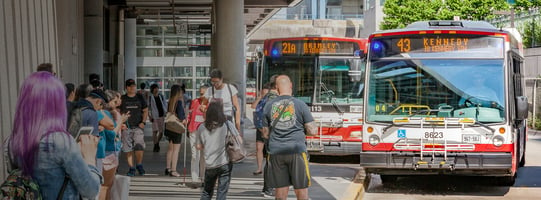Plan includes transformative benchmarks for success, mayoral candidate says Toronto – Mitzie...
Mitzie Hunter issues five-point plan to address mental health, addiction crisis
City must play central role supporting needs, mayoral candidate says
Toronto – Mitzie Hunter, mayoral candidate, marked Mental Health Week by issuing a five-point plan to address our mental health and addiction crisis.
Hunter’s five-point mental health and addiction plan includes:
- Hiring a Chief Mental Health Officer (CMHO)
- Re-launching Toronto’s Mental Health Support Strategy (MHSS)
- Creating a long-term, comprehensive Mental Health and Addiction Strategy
- Increasing the Community Service Partnerships (CSP) program fund
- Creating a technology fund to modernize the integration of city and provincial mental health and addiction services.
“Health care is primarily the responsibility of the province, but at a time when our leading organizations are sounding the alarm, the City can and must play a more central role in supporting the mental health and addiction needs of our people,” Hunter says.
“Other mayoral candidates are throwing up their hands saying they can’t do anything. I am saying we can and we must help our own people. It is a crisis. Human dignity demands we take action. Leadership makes it happen.”
Here’s how Hunter’s plan works:
- Hiring a Chief Mental Health Officer (CMHO):
o Providing advice to the Mayor, City Council, and the Medical Officer of Health
o Helping guide the City’s response to the Mental Health and Addiction crisis.
- Re-launching Toronto’s Mental Health Support Strategy (MHSS):
o Initially launched in 2020 to respond to the Mental Health impacts of the Covid-19 pandemic, participating agencies provided critical mental health services to people including seniors, persons with disabilities, and young persons with complex mental health needs.
o Relaunching provides a lifeline to residents in need as well as data and insights about the ongoing needs of service users, which in turn inform council policies.
- Creating a long-term, comprehensive Mental Health and Addiction Strategy (MHAS):
o Taking a prevention-focused approach that is evidenced-based, including the voices of persons with lived experiences.
- Increasing the Community Service Partnerships (CSP) program fund:
o Works toward mental health and violence prevention
o Provides increased core operating funds to non-profit and charitable organizations for the next three years
o Investing in the long-term sustainability of these organizations helps ensure long-term wellness of our city's youth.
- Creating a technology fund to modernize the integration of city and provincial mental health and addiction services:
o Ensures better care and service coordination between hospitals, primary care organisations, developmental service agencies, community mental health organisations, and City-funded programs and services including shelters, case management and supportive housing organisations.
Hunter’s plan builds on her previous, already-announced homelessness and youth mental wellness plan that includes the creation of five new Housing Outreach Program Collaboration (HOPC) teams and 2,000 supportive housing units, 10 per cent of which will be earmarked for persons with developmental disabilities experiencing homelessness.
The cost of the mental health and addiction plan is $5 million. It is part of her fully-costed, comprehensive budget plan which will be issued before voting begins in June.
“Helping the City’s most vulnerable, persons experiencing mental illness, and those struggling with substance use challenges, starts by making sure our programs and services are evidence-based, collaborative in nature, and singularly focused on recovery,” Hunter says.
“I bring fresh eyes and new solutions to do something meaningful for our people experiencing mental illness and suffering from addiction.”
-30-
Contact:
Charmain Emerson charmain@culturedcommunications.ca
Remarks by Mitzie Hunter announcing her five-point plan to address mental health and addiction crisis
- This is Mental Health Week as well as Children’s Mental Health Week.
- There is no better time for a frank discussion about mental health and addiction.
- During this campaign I have been having regular conversations with people about mental health, addiction and the related issue of homelessness.
- It is a crisis. We all know it.
- Maybe it is someone in your family.
- Maybe it is a neighbour.
- Maybe it is someone in a park… or sheltering on the TTC.
- I have been listening and, as mayor, I will continue to actively listen on how our city can better support everyone's mental health.
- That’s why, as part of Mental Health Week, I’m announcing my five-point plan to address mental health and addiction crisis.
- One… Hiring a Chief Mental Health Officer (CMHO)
- Two… Re-launching Toronto’s Mental Health Support Strategy (MHSS)
- Three… Creating a long-term, comprehensive Mental Health and Addiction Strategy
- Four… Increasing the Community Service Partnerships (CSP) program fund
- Five… Creating a technology fund to modernize the integration of city and provincial mental health and addiction services.
- The cost of the plan is $5 million.
- It is part of my fully-costed, comprehensive budget plan which will be issued before voting begins in June.
- This announcement builds on builds on my previous, already-announced homelessness and youth mental wellness plan.
- My plan helps the City’s most vulnerable… persons experiencing mental illness… and those struggling with substance use challenges.
- It starts by making sure our programs and services are evidence-based… collaborative in nature… and focused on recovery.
- This is about our family. Our friends. Our neighbours. Our young people.
- Mental health and addiction. There is a moral imperative that we take action.
- As mayor, I will take action. I will not wait. I will not throw up my hands and say it can’t be done.
- It can be done. It must be done. Leadership gets it done.
- I bring fresh eyes and new solutions to do something meaningful for our people experiencing mental illness and suffering from addiction.
- That’s why I am running for mayor.





